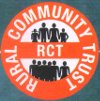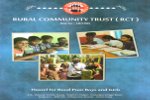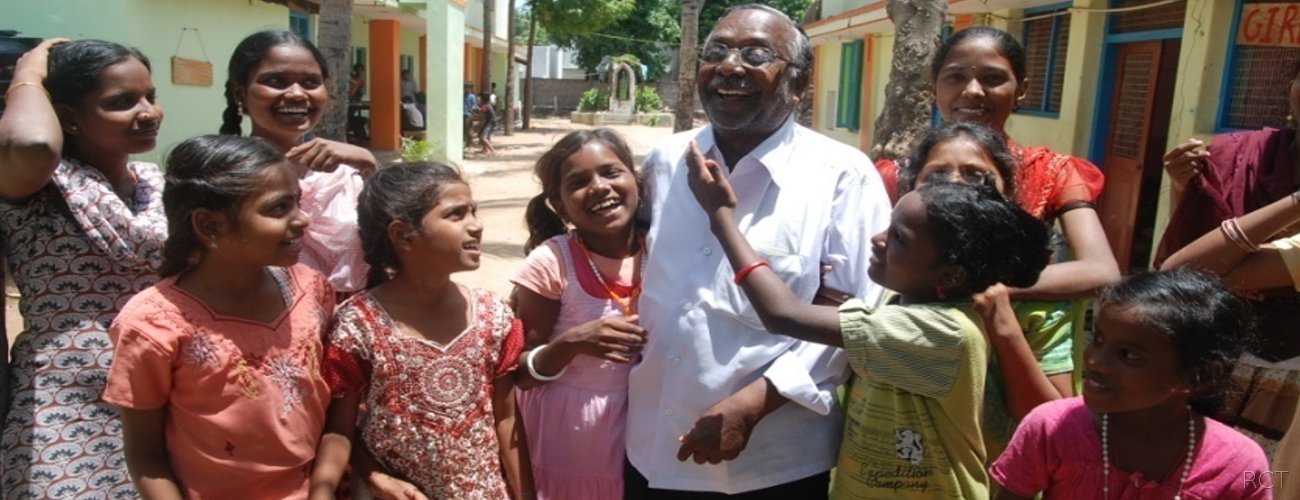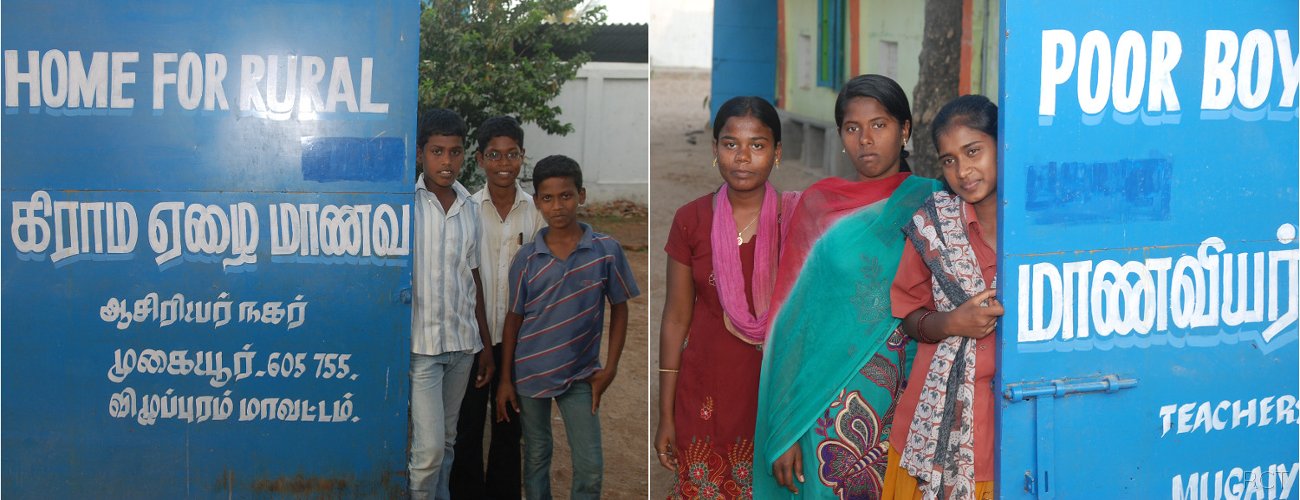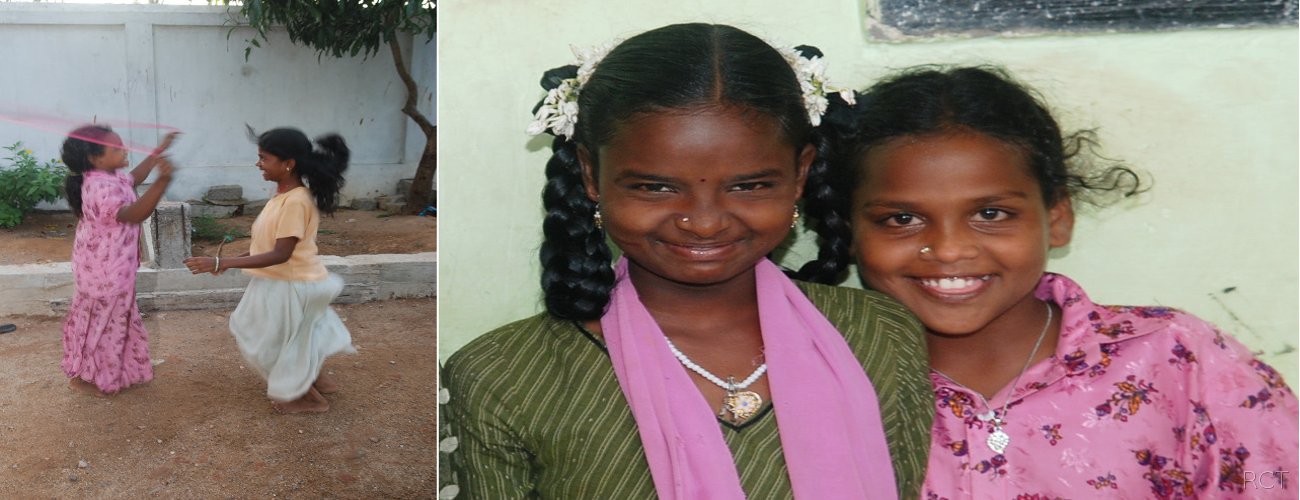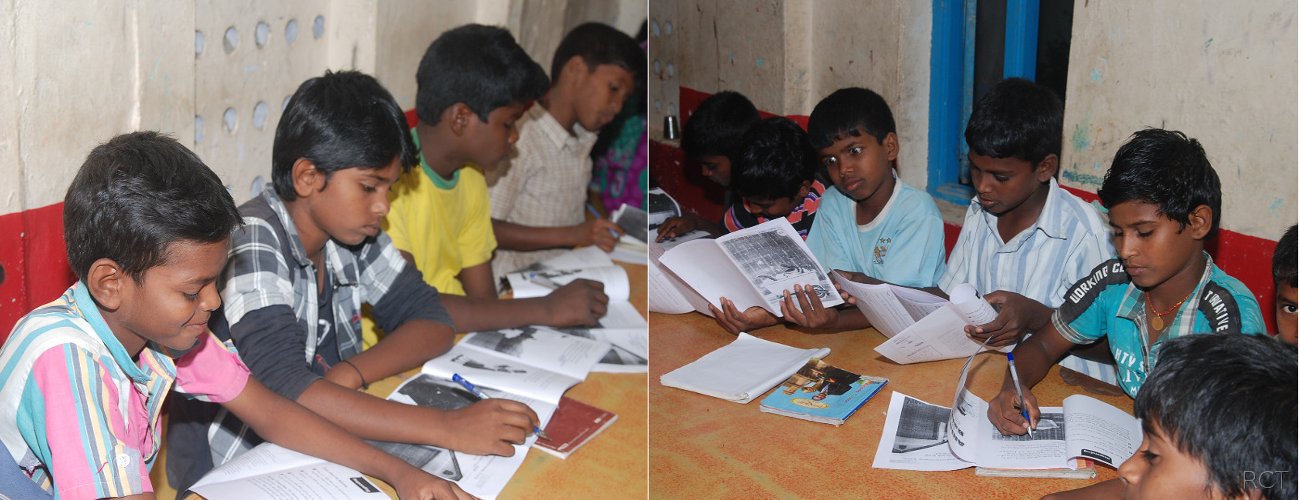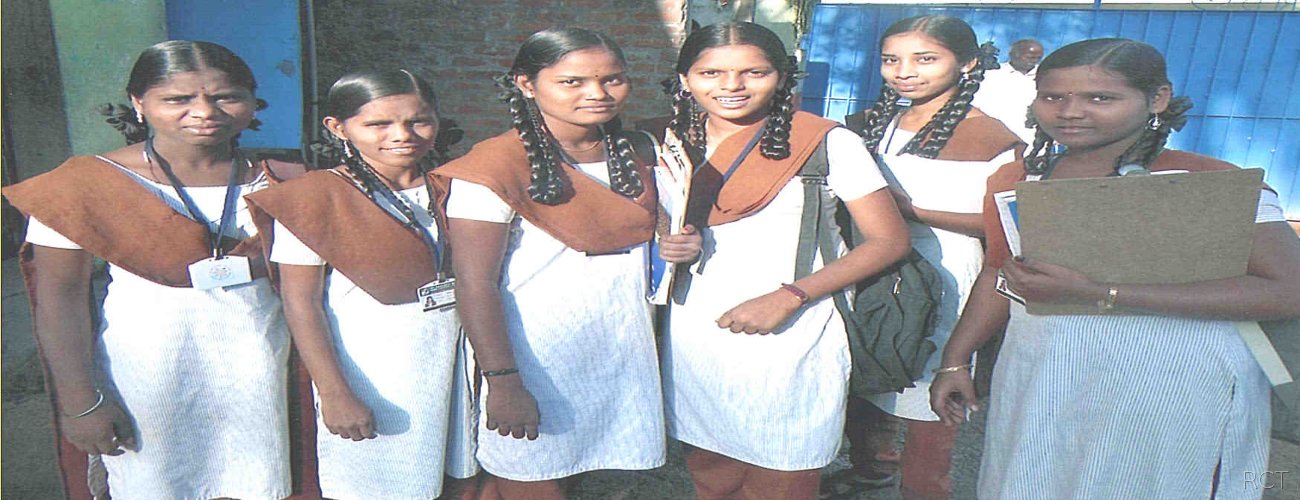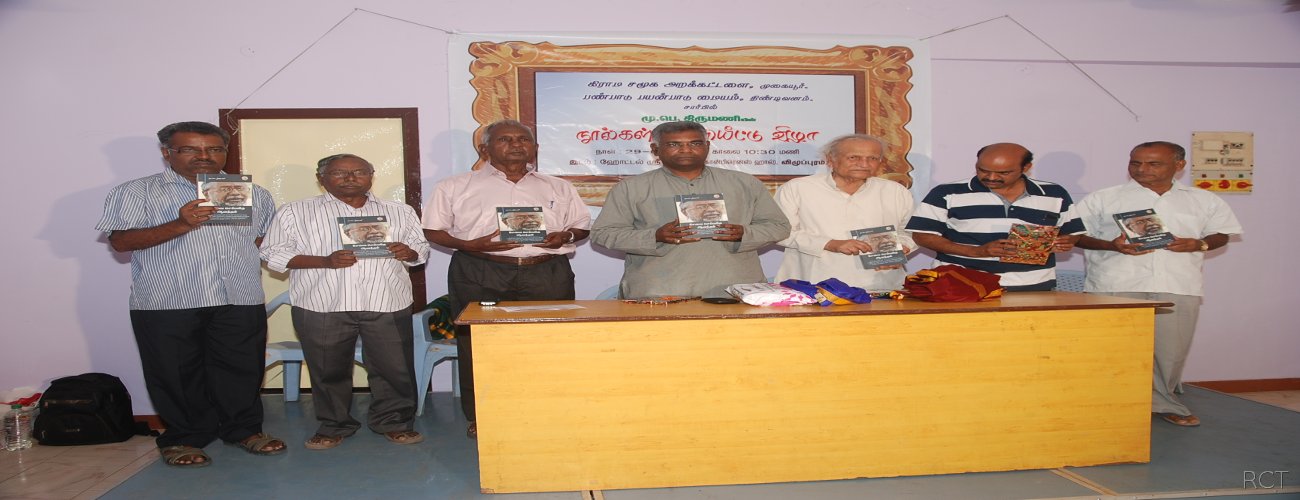- Home
- Welfare Schemes
RCT ‐ Welfare Schemes
Kottaimaruthur, kodokupattu, velakulum, Madaivilagam, siddapattinam, Manalurpettai, MGR Nagar, Kandachipuram, Nayanur, Thanikalampetti, Kaduvetti, Manampoondi, Kozhvnthirampet, Kazhumaram, Soraiyaper, Kollur Navampet, Aradappttu, pappampadi, anna nagar, sanniyasi nagar, kalleri
In 1986 Rural Community Trust began running street level adult literacy classes in the villages. At these classes we introduced the idea of women sangams, and the first sangams were formed in the early 1990’s. In many of these villages men sangams had been formed in the 1980’s, but nowhere was there a similar organisation for women. The sangams were set up to challenge village development problems – such as the need for water pipes, housing, lighting, and land – and those problems faced specifically by women. In many of the villages the women’s sangam is solely responsible for mobilising the villagers. There are currently 21 sangams. Each sangam has an elected president and nine executive members appointed by the president.
- To mobilise rural women in order to obtain their basic rights from the government.
- To challenge problems faced by the rural women, such as the dowry system and domestic violence.
- To create awareness within the village on development issues, and to promote environmental and health issues.
- To improve the standard of living of sangam members and their families.
- To provide independent livelihoods for rural women and encourage self-sufficiency.
- To raise the status of women in the family, the village and society as a whole through an improvement in their economic situation and a re-evaluation of their capabilities.
The sangams have successfully petioned the government at all levels and obtained many basic amenities for their villages. A few examples are
1994- Manalurpettai village: extra water pipe and more sanitation pipes.
1995- Velakulam village: one light service for 50 houses, street lighting, 20 group houses, Rs 1, 50,000 of patta land construction.

1996- Kottaimaruthur village: patta land for 150 families.
The sangams mobilised villagers and raised awareness among rural people of their basic rights and how to obtain them. In addition they have brought people together in a co-ordinated effort to achieve their objective. The sangams provide a united organization through which women can challenge the problems they face. Problems (such as alcoholic husbands) can be dealt with collectively, which would be impossible to lead with an individual level.
Through attending meetings and visiting government offices, the sangam member’s political and social awareness has been considerably raised. At the same time their position within their family is changing. Women are no longer expected to be sub servants to their husbands and are beginning to be seen as valuable decision makers and agents of change.
In addition the sangams are responsible for small savings projects and promoting economic independence among rural women.
- To continue to petition the government for basic village amenities.
- To obtain government loans and take part in government schemes.
- To increase small savings deposits in order to provide loans to sangam members.
The federation was setup in 1993 to co-ordinate the village sangams so as to better achieve their common goals. It meets 2 times in a month and is made up of 7 members of each sangam. It runs a small savings cooperative which is used to fund the projects. The federation is particularly concerned with economic development for women and plans several future village level projects including raising chickens, small handicraft workshops and nurseries.
Kottaimaruthur, kodokupattu, velakulum, Madaivilagam, siddapattinam, MGR Nagar, Kandachipuram, Nayanur, Thanikalampetti, Kaduvetti, Manampoondi, Kozhvnthirampet, Kazhumaram, Soraiyaper, pappampadi, anna nagar, sanniyasi nagar, Su Vazhavetti.
The small savings project is a 3 year venture which was began in 1994. There are currently individual projects in 18 projects villages where they are run jointly by the women’s sangam and an RCT field worker. At the end of the third year all the individual projects will be united into one village Rural Assist Bank and the RCT will withdraw from the project.
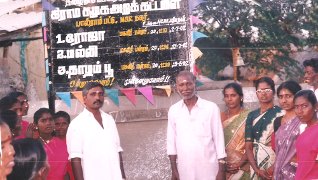
Many of these villages are populated by landless labourers. Constant monsoon failure in the area means that even this meagre income source is now unreliable. Therefore there is a large scale move towards the cities in order to seek employment.
Members are now saving between Rs 5 and Rs 50 per month, where previously there was no saving at all. In total the small savings projects amount to Rs 1, 50,000. In addition, small projects, people have come to learn about money management and the mechanisms of simple banking.
By the end of the 5th year, the small savings is expected to amount to Rs.5, 00,000. In addition to this the RCT hopes to obtain Rs 150,000 of funding to contribute towards Rural Assist Bank. This bank will be run entirely by and for the people. The members will be responsible for the bank’s policies, such as who will receive loans, and the interest rate charged. The RCT will at this point withdraw from the project, since its aim is to create self-sufficiency and independence amongst the villages, and not to simply shift the people’s dependence to reliance on an NGO.
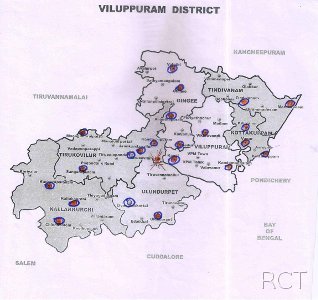
Since 1986 RCT have initiated various skill training schemes throughout the villages. These generally consist of rolling courses lasting a maximum of 6 months, and therefore can cater to a large number of people. The schemes are aimed mainly at rural women and young people.
- To provide poor rural women with skills so that they may eventually become self-employed and earn an independent living.
- To free landless women from agricultural labour.
- To improve the employment chances of educated but unemployed rural youth.
- To improve the overall economic situation in rural villages and therefore the quality of life of the people.
Based at the HRPB site in Mugaiyur village, the Rural Technical Education Centre has been running since 1986. The centre teaches typewriting skills (English and Tamil) to unemployed, educated young people in order to improve their employment opportunities. The centre caters to 25 young people at a time and is run by a qualified teacher. The course lasts 6 months and costs Rs 120 per month. At the end of the course the students take a government approved typing examination.
In 1995 a tailoring institute was opened at the RRRDA site in Navampattu village. It offers 6 month training to rural women, with the aim of enabling them to take up self-employment. It is run by a qualified teacher and costs Rs 25 per month. There are currently 15 women from 5 villages attending this course. The federation of women’s sangams is keen to promote this scheme throughout the villages so that as many women as possible may be benefited.
15 women were taught mat weaving skills over a three month period. These women are now successfully self-employed and therefore no longer reliant on the earnings of low paid unreliable agricultural labour. This particular scheme has been temporarily discontinued, but will be restarted in the near future.
Currently 10 rural women attend a weekly class to learn how to paint greeting cards, which are then sold in the nearby towns. After 6 months these women will have gained the skills needed for self-employment and the course will begin again with a new batch of students.
- To begin a similar scheme teaching rural women candle making skills.
- To setup a Vocational Guidance the Light Engineering Training Scheme for rural young people. We aim to provide 6 to 12 months full training in a variety of trades. These will be taught by a fully qualified teacher, and each student will choose his/her own course.
kullur - V.R.P Dt., Kalleri – T.S. Dt.
The two centres were set up in 1995 to meet a desperate need among elderly people in the villages. Increasing urban migration has led to many elderly people left alone in extreme poverty. Subsequently many of them suffer from malnutrition as well as great loneliness. The land for the centres was donated by the respective village administrations, and the labour provided by the elderly people along with other villagers. Kalleri Day Care Center has 3 field workers and Kollur 3
- To provide elderly people with good nutrition.
- To provide elderly people with skill training so that they may have a means of supporting themselves.
- Most importantly, to make people happy and allow them to enjoy the last part of their lives with dignity.
In total the two centres currently cater to the needs of 50 elderly people. They provide lunch as well as well as morning and afternoon tea. The centres open at 10 a.m. and the mornings are spent learning skills such as bookbinding and making paper bags from recycled paper. These handicrafts are then sold, and the profits used to fund celebrations on festival days and to buy daily newspapers for the centres. In the afternoon the elderly people take part in games and singing, and the day ends at 5 p.m. with a discussion.
In addition the centres organize “happy tours” – day trips to local places of interest, and have run eye camps in conjunction with a local hospital. The elderly people also contribute Rs 5 each per month to a small savings scheme which is then used for their emergency needs. Each centre has an Aged People’s Sangam which meets once a month to decide on issues to do with the running of the centre. In this way the centres truly belong to the elderly people themselves.
Subject to funding, RCT hopes to open 5 more centres in local villages over the next 5 years. We also plan to purchase land in order to grow enough to provide for all the food needs of the centres and thereby drastically reduce running costs.

Since few of these villagers own land, they are unable to grow food and consequently their diet is nutritionally very poor. Health problems associated with poor nutrition are common, as are communicable diseases. There is very little knowledge of how these diseases are spread and very few children are fully immunised. To counter these deep-rooted problems a Health and Environmental Education Programme was initiated in 1995 and is run from the RRRDA site at Navampattu village. A small plant nursery was started at this site in 1994 and a rural clinic is currently being constructed.
- To raise the nutritional status of rural people.
- To provide a clinical service – both preventive and curative – to rural families.
- To provide health and environmental education to rural people in order to improve their life situations.
- To raise awareness of environmental issues and encourage a better use a land, particularly the planting of fruit bearing trees.
Weekly health education classes are currently being held in all the villages in the RRRDA area. These are taught by the field workers. In addition, environmental education classes are held at two village schools. This is the first time that an NGO has been allowed to teach in a regular government panchayat school in Tamil Nadu. As part of this programme the children are taken to visit government nurseries where various plant raising skills are demonstrated. In addition, 100 of these boys were papaya seedings as a means of raising the nutritional status of their whole families.

In order to raise both the nutritional and economic status of rural people. 500 families were each given 5 seedings: 3 fruit bearing seedings (Jackfruit/papaya/mango) and two forestry seeding’s (casurina/teak). The survival rate is currently more than 50% and great interest has been shown throughout the villages for on-going tree planting.
The small nursery at Navampattu village is satisfied by a trained gardener and serves a double purpose of both a demonstration plot where villagers and school children can learn nursery skills, and also a place where they can buy seedings at a reasonable cost. Planting trees on common, as well as private land, is encouraged in order to improve the environment and the land use system.
Once the clinic is completed, a qualified doctor will provide a clinical service for common ailments 3 times a week. This service will be a preventive as well as a curative one. On the other 2 week days the doctor, along with a nurse, will visit the surrounding villages. Day long health education seminars will be run fortnightly in the villages, and each month RCT/RRRDA staff will attend a seminar on community health practises and common ailments. In addition a health worker and nurse will visit the villages monthly to provide visual education on diseases.
Chulla (stove) smoke is a big health and environmental hazard, particularly for rural household women. Therefore we plan to distribute 150 smokeless chullas to selected women on a trial basis. Suitable household women will then be chosen to expand this project and implement it in other villages.
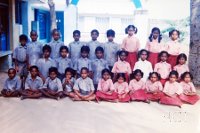
In 1998 we set up a nursery school for pre-school age children (0-5 years) from the economically weak sectors of society. Two trained nursery teacher’s taught 50 children’s how to read, write, count, sing and play. There was also a child care assistant to look after all their other needs. Sadly however we had to close the nursery in 1995 due to lack of funds. We are very eager to reopen it as soon as we are able to secure the necessary funding.
- To provide poor children with the best possible educational start in life so that they may overcome the disadvantages of their backgrounds.
- To provide a safe and happy environment in which neglected children may play, learn and grow as healthy, happy children.
